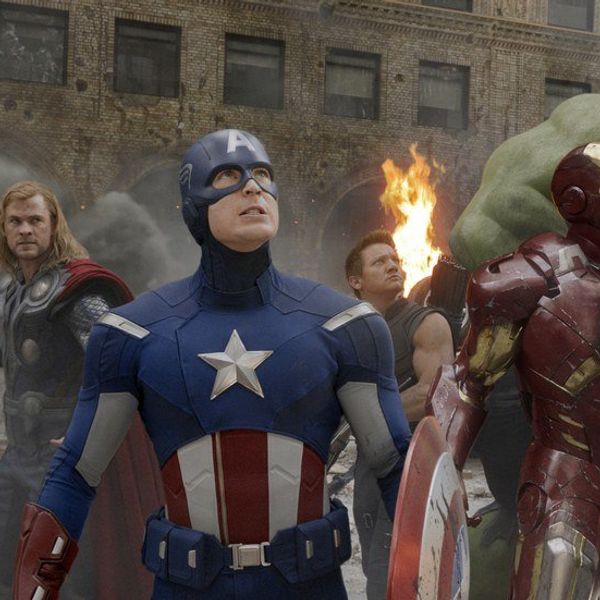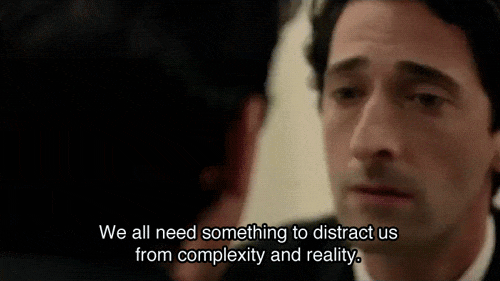If you're like me, you might have spent a lot of time waffling between which major you wanted to devote yourself to for the foreseeable next four years. For me, it was, should I go into Illustration? Or creative writing? Or film?
But once I had settled on filmmaking as my primary passion, it was fairly easy to narrow down which colleges I wanted to attend: there were only two places I could go, at that point, or so I believed.
L.A. or NYC.
New York, to me, seemed the obvious choice. I had grown up in Upstate New York. Living in the city would put me a train ride away from family in case of dire emergency, put also far enough away, and in diverse enough an environment that I was guaranteed to get a full and rich experience of what it is like to live out among the world. I no longer wanted to live in a bubble.
At the time, New York also seemed to me the more attainable choice, especially in terms of career. I knew that New York was becoming known as the mecca for the independent film industry, an industry that I felt like would probably be much easier to break into than Hollywood.
I had chosen New York as my hub for this reason, and yet I still found myself taken back, at first, when I first came into contact with the negative attitude some of my fellow classmates and professors harbored towards "the mainstream industry".
I'm not entirely unsympathetic to their views. If I, too, didn't think Hollywood was flawed and somewhat dysfunctional, I wouldn't have come to New York. But I did not come to New York out of animosity for Hollywood, and after a little more than three years attending school here, my taste in film still has not changed. If you asked me what some of my favorite films are, I would still answer Inception, The Lego Movie, or maybe even Sherlock Holmes. The only difference is, I now would never announce this preference in a class setting.
I am not trying to discount the indie film industry. But there seems to be a bias among indie and especially student filmmakers that Hollywood is no longer producing good, authentic narrative. If it ever was at all.
I can see where this perspective is coming from. As much as I love book-to-film adaptations, and some of the big movie franchises like Marvel, originality in Hollywood is on the drop, and its heartily disappointing. The top-grossing films are all adaptations or reboots at this point, with a few exceptions. With such a drought of originality, it's understandable that people would begin to covet nontraditional narrative, or even put aside narrative altogether.
There is a lot of merit in nontraditional narrative, and experimental film, and I've thoroughly enjoyed such films I've come across. I've also thoroughly disliked some of the more "independent" content I've come across. And therein lies the problem. This new wave of bias for film, though seemingly stemming from a thirst for fresh and original content, often completely discounts an entire category of film. By dismissing traditional narrative as hackneyed and stale, we close ourselves off to a selection of content which is rich in story and still capable of sparking new ideas and internal movements.
I have no illusions that Captain America: The Winter Soldier or any of the other superhero blockbusters to come out this past decade are, in any way, new or original. They're reboots of a reboot. The Conjuring or You're Next aren't films that have revolutionized the horror genre. They're formulaic, simple, and even somewhat predictable. But they're still films that I have enjoyed, and films that millions others have enjoyed, and, like me, could probably discuss with you for hours. Why?
The mistake of Hollywood isn't with its method of storytelling. Its error is the same as the film students who praise indie, while simultaneously dismissing the legitimacy of mainstream cinema. The fault lies in disclaiming the potential that mainstream media has to convey complex, and sometimes even disturbing concepts, that we have been wrestling with for centuries.
Hollywood's mechanism for telling stories may not be subtle, nor as artful as some of the fantastic filmmakers who have broken out into the independent film industry. But Hollywood's stories can be just as cathartic, and just as profound. And even more importantly: they're accessible. Not just in the physical sense - having millions to spend on production and distribution puts Hollywood rather unjustly ahead of the curb, in that sense - but a general audience is more like to engage with a story they feel is approachable. Sometimes that means being more familiar; more mundane.
There is a lot to respect and enjoy about intellectual cinema, but there is a common misconception within it that complex ideas must be communicated through art in a complex way in order to be fully understood. Nothing could be further from the truth. As artists, by engaging with intricate and complicated ideas, and expressing them through modes of storytelling that use tropes and themes that are familiar to all, we do not dumb these ideas down: rather, we put them into layman's terms. We make them available; reachable to a much larger audience.
Intellect does not belong to the intellectual. Anyone is capable of engaging with complex concepts, because everyone in themselves feels things complexly. Watching Captain America may not inspire the casual viewer to write epithets on the complexity of screenwriting or explore such themes of modern conspiracy and mistrust in their own work. But a casual viewer may experience the same powerful catharsis and subtlety of emotion watching a blockbuster as does an avid consumer of the uncelebrated filmmaker. What is mundane, is also intimate. And what is intimate, is also effective.
Intimacy in storytelling, and especially in film, is something to aspire to. As filmmakers, as storytellers, we can aspire to intimacy without closing ourselves off to traditional modes of storytelling. Shakespeare understood that. A lot of the "greats" did.
Originality in thought is to be applauded, but it should not be the standard we hold storytelling to. Whether content has effect on its consumer is the principle that is most essential to story.
And so, in the war of mainstream versus indies, nobody wins. No matter what industry you belong to, there will always be content creators who move audiences, and inspire in them new concepts and emotion. If we are to motivate further generations of creatives, we must not invalidate or discourage effective narrative - however it comes to us, and from wherever it may arrive.























